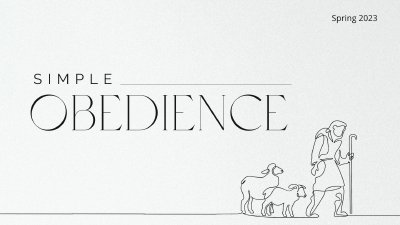Matthew 16:21-28 Sermon Information
Series: Simple Obedience
Title: “Following the Suffering Savior”
Context:
16:1-12 – Guard against the teaching of the Pharisees and Sadducees
16:13-20 – Peter makes his confession of Christ, revealed by the Father
16:21-23 – Jesus foretells his death and resurrection; Peter rebukes Jesus
16:24-28 – The requirements of following Jesus
Jesus foretells his death and resurrection (16:21-23) – “the sign of Jonah”
“From that time” (21) – marks a shift in Jesus’ ministry toward Jerusalem (crucifixion)
Jesus reveals the nature of his Person and Work
He came to suffer; he came to die; he came to conquer death
These are the conditions of Jesus’ messiahship foretold by the Prophets (see Isaiah 53)
Peter rebukes Jesus (22)
Peter had a different kingdom in mind than Jesus’
Zeal and sincerity are not sufficient qualifications for faithfulness to Christ (Proverbs 19:2-3)
Jesus rebukes Peter (23)
Peter’s attempt to protect Jesus was really an attempt to protect his assumptions about Messiah
Peter’s attempt to protect Jesus stood in opposition to the will of God
Peter’s attempt to protect Jesus was more aligned with Satan than with God (Satan had offered Jesus a kingdom without suffering, see Matthew 4:8-10)
Peter was preoccupied with earthly things (see Colossians 3:1-4)
Jesus gives the requirements of following him (16:24)
“if” – conditional statement implying specific requirements
“anyone” – implies all; universally applicable without partiality
“come after” – follow; be yoked to Christ; unified with Christ (see Ephesians 1:3-14)
“let him” – conditions of yoked-ness with Christ (see 10:38)
deny himself – relinquish self-centered, earthly allegiance; submit to Christ
take up his cross – embrace suffering and death; identify with crucifixion and its implications
follow me – lit. “go where I go” (i.e. to Jerusalem to suffer, die, resurrect)
Jesus gives his reasoning (16:25-28)
His kingdom has different values (25-26)
In God’s kingdom: gain = loss; loss = gain
Self-preservation leads to self-destruction
Your soul > Your possessions/ accomplishments
“An empty vessel is the only thing that can be filled”
He will repay us in his kingdom for what we have done (27; see 2 Cor 5:10; Rev 20:11-15)
Promise: seeing his glory (witnesses of the transfigured, crucified, resurrected Christ)
Main Point:
God’s grace in Christ transforms our perspective and our values. Only grace received from the fullness of Jesus can free us from obsessively protecting our lives and liberate us to generously give ourselves away for God’s glory and the good of others as we live as citizens of his kingdom.
Discussion Questions:
How are you prone to redefine the nature of discipleship (following Jesus) to better fit your expectations, assumptions, and desires?
Are you guilty of rebuking God in any way? (often displayed in our attitude toward suffering)
Have you embraced the requirements of following Jesus?
What areas of self-will remain that need God’s grace to work?
Where are you prone to indulge your flesh rather than deny it?
Where do you resist (or even resent) what following Jesus costs you?
Are there ways that you have denied self and counted that cost that you can humbly rejoice over as evidence of your discipleship?
What is most likely to threaten your allegiance to Christ? Confess these things and trust that God wants to give you his grace to change your heart so that you joyfully “count all things as loss compared to the surpassing greatness of knowing Christ Jesus [your] Lord” (Philippians 3:7-11).
How do your values align with God’s values? How are they not aligned? What needs confessed and repented of?
Rather than raise up in self-protective defense, go low in humble confession. Jesus promises to meet you in your weakness and in your need to give you sufficient grace for a life of obedience.
Remember that your lack is not the issue. Jesus makes full provision. His power is made perfect in our weakness (2 Cor 12:9-10). Ask him to meet you there, in your weakness. Confess honestly and boldly where you are more devoted to self than to Christ. Trust him to be merciful and to cleanse you. There is no condemnation and he will keep making you holy for his name’s sake. Rejoice in this!
Does Jesus’ word in 16:27 scare you or comfort you? Why? How does Jesus’ work on the cross bring hope and comfort as we learn to deny self, carry our cross, and follow him? (see Romans 8:28-32; Philippians 1:6; 1 Thessalonian 5:23-24; Hebrews 2:14-18; 4:14-16; 10:14-18; 1 John 1:9-2:6)





